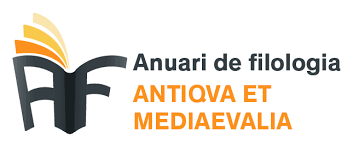A note on the "Thrax" of Euphorion: SH 15.II.1FF.
Paraules clau:
Euphorion, Thrax, Dike, ”enigma”, exemplumResum
This paper tries to consider the Archaic or Classical origins of Dike or dike, starting by Hesiod and Aeschylus or some indexes which show its religious meaning, and its evolution from the “religious” treatment to the “exemplum” by Euphorion in his “curse poem” the Thrax. Although the probable ironical nature of the Thrax would suggest that Dike is a literary rather than religious figure, it is difficult to support so, because the poem may well be something of a mock-‐‑ complaint on either a dog or another pet animal, but this does not imply that Dike, as a figure, is not serious. The relevant lines of the poem (SH 415.ii.1ff.) are quite serious in themselves: Dike and Themis are introduced as powerful divine entities regulating human life. But references to the possible “dog” in the Thrax may involve “l´énigme par fragmentation” and this shows the importance attached to “enigma” in Greek texts, as well as in the Thrax, according to Hurst´s proposal.Descàrregues
Publicades
2015-06-16
Com citar
Clua Serena, J. A. “1FF”. Anuari De Filologia. Antiqua Et Mediaeualia, vol. 2014, no. 4, June 2015, pp. 17-26, https://revistes.ub.edu/index.php/AFAM/article/view/13594.
Número
Secció
Estudis d'Antiguitat i Cultura Clàssica
Llicència
L'autor/a que publica en aquesta revista està d'acord amb els termes següents:
a. L'autor/a conserva els drets d’autoria i atorga a la revista el dret de primera publicació de l’obra.
b. Els textos es difondran amb la llicència de Reconeixement de Creative Commons, la qual permet compartir l’obra amb tercers, sempre que en reconeguin l’autoria, la publicació inicial en aquesta revista i les condicions de la llicència.
Taxes d'enviament i publicació: Anuari de Filologia. Antiqua et Mediaevalia no cobra taxes per tramesa de treballs, ni tampoc quotes per la publicació dels seus articles.







